env MIBS="+/root/.snmp/mibs/TEST-MODULE.MIB" mib2c TEST-MODULE::testModule
在ubuntu终端输入上面的指令前 确保 MIB文件已经拷贝到了对应的目录 另外确保mib2c工具已经安装了 前面Ubuntu安装snmp的两种方式 通过apt安装的时候会已经安装了mib2c工具
回车后提示:
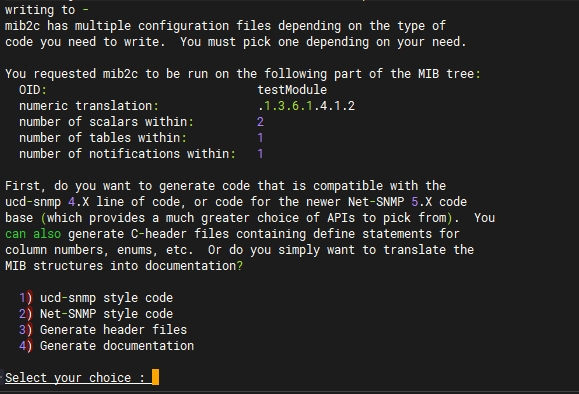
这里询问我们选择那种类型的代码分格 我们后面 需要用net-snmp所以这里选择2
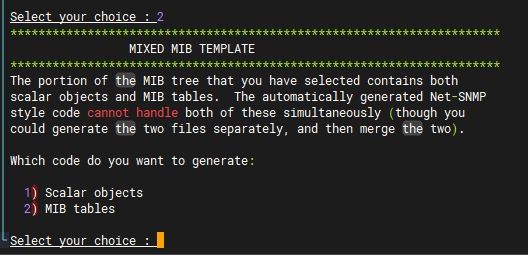
这里检查到我们的MIb树中包含标量和表格对象,这里自动生成的net-snmp分格的处理器不能同生成两种分格代码 需要分开生成 然后在合并 ,我们先生成标量类型的选择1
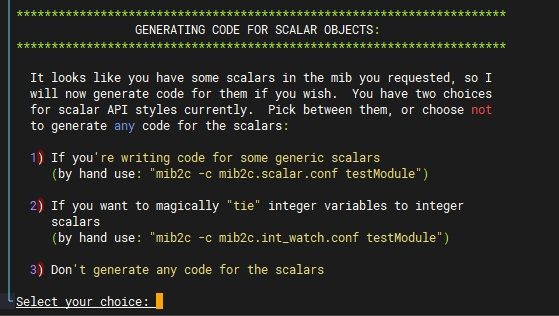
这里提示我们可以选择选择标量 API 风格还是魔法绑定整数变量
选择标量 API 风格(mib2c.scalar.conf)
自定义数据处理:需要手动实现标量值的获取/设置逻辑(如从硬件传感器读取数据或写入配置)。
复杂业务逻辑:标量值与其他系统组件(如数据库、外部 API)交互时需额外处理。
灵活性要求高:需完全控制标量对象的行为(如验证输入、触发事件)
代码框架:
static int handle_myScalar(netsnmp_mib_handler *handler, ...) {
switch (reqinfo->mode) {
case MODE_GET:
// 自定义获取逻辑(如读取系统时间)
snmp_set_var_typed_value(...);
break;
case MODE_SET:
// 自定义设置逻辑(如写入配置文件)
break;
}
return SNMP_ERR_NOERROR;
}
魔法绑定整数变量(mib2c.int_watch.conf)适用
简单监控需求:标量值直接映射到内存中的整数变量(如计数器、状态标志)。
无需复杂逻辑:只需自动同步变量值与 SNMP 标量,无需额外处理。
快速原型开发:快速测试或临时监控某个整数值。
生成代码:自动创建变量与标量的绑定,例如
static int myScalar_value = 0; // 内存中的变量
netsnmp_register_scalar(..., &myScalar_value);
这里我们选择1
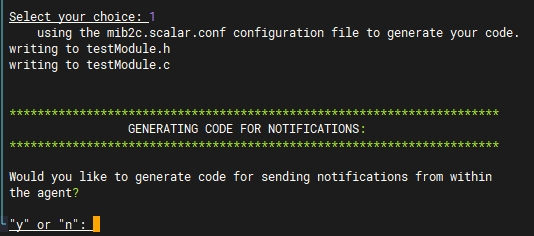
询问是否需要为notifications生成代码 这里我们选择n 如果选择y的话会覆盖前面的标量代码
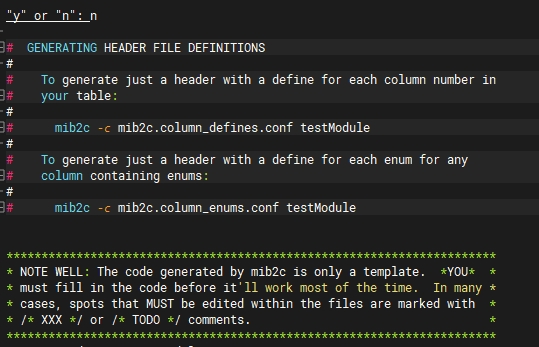
最终生成的.c文件 有中文注释修改的地方就是后面我们需要调整的地方
/*
* Note: this file originally auto-generated by mib2c
* using mib2c.scalar.conf
*/
#include <net-snmp/net-snmp-config.h>
#include <net-snmp/net-snmp-includes.h>
#include <net-snmp/agent/net-snmp-agent-includes.h>
#include "testModule.h"
/** Initializes the testModule module */
void
init_testModule(void)
{
const oid objtype1_oid[] = { 1,3,6,1,4,1,2,1,1 };
const oid objtype2_oid[] = { 1,3,6,1,4,1,2,1,2 };
DEBUGMSGTL(("testModule", "Initializing\n"));
netsnmp_register_scalar(
netsnmp_create_handler_registration("objtype1", handle_objtype1,
objtype1_oid, OID_LENGTH(objtype1_oid),
HANDLER_CAN_RWRITE
));
netsnmp_register_scalar(
netsnmp_create_handler_registration("objtype2", handle_objtype2,
objtype2_oid, OID_LENGTH(objtype2_oid),
HANDLER_CAN_RWRITE
));
}
int
handle_objtype1(netsnmp_mib_handler *handler,
netsnmp_handler_registration *reginfo,
netsnmp_agent_request_info *reqinfo,
netsnmp_request_info *requests)
{
int ret;
/* We are never called for a GETNEXT if it's registered as a
"instance", as it's "magically" handled for us. */
/* a instance handler also only hands us one request at a time, so
we don't need to loop over a list of requests; we'll only get one. */
switch(reqinfo->mode) {
case MODE_GET:
snmp_set_var_typed_value(requests->requestvb, ASN_INTEGER,
/* XXX: a pointer to the scalar's data */,
/* XXX: the length of the data in bytes */);
// snmp_set_var_typed_value(requests->requestvb, ASN_OCTET_STR,
// "test", //定义的变量名称buff
// strlen("test") //buff的长度
// );
break;
/*
* SET REQUEST
*
* multiple states in the transaction. See:
* http://www.net-snmp.org/tutorial-5/toolkit/mib_module/set-actions.jpg
*/
case MODE_SET_RESERVE1:
/* or you could use netsnmp_check_vb_type_and_size instead */
ret = netsnmp_check_vb_type(requests->requestvb, ASN_INTEGER);
if ( ret != SNMP_ERR_NOERROR ) {
netsnmp_set_request_error(reqinfo, requests, ret );
}
break;
case MODE_SET_RESERVE2:
/* XXX malloc "undo" storage buffer */
if (/* XXX if malloc, or whatever, failed: */) {
netsnmp_set_request_error(reqinfo, requests, SNMP_ERR_RESOURCEUNAVAILABLE);
}
break;
case MODE_SET_FREE:
/* XXX: free resources allocated in RESERVE1 and/or
RESERVE2. Something failed somewhere, and the states
below won't be called. */
break;
case MODE_SET_ACTION:
/* XXX: perform the value change here */
if (/* XXX: error? */) {
netsnmp_set_request_error(reqinfo, requests, /* some error */);
}
break;
case MODE_SET_COMMIT:
// static char buff[256]="";
// /* XXX: delete temporary storage */
// memcpy(buff,requests->requestvb->buf,requests->requestvb->val_len); // 赋值
// buff[requests->requestvb->val_len] ='\0'; //字符串结束符
if (/* XXX: error? */) {
/* try _really_really_ hard to never get to this point */
netsnmp_set_request_error(reqinfo, requests, SNMP_ERR_COMMITFAILED);
}
break;
case MODE_SET_UNDO:
/* XXX: UNDO and return to previous value for the object */
if (/* XXX: error? */) {
/* try _really_really_ hard to never get to this point */
netsnmp_set_request_error(reqinfo, requests, SNMP_ERR_UNDOFAILED);
}
break;
default:
/* we should never get here, so this is a really bad error */
snmp_log(LOG_ERR, "unknown mode (%d) in handle_objtype1\n", reqinfo->mode );
return SNMP_ERR_GENERR;
}
return SNMP_ERR_NOERROR;
}
int
handle_objtype2(netsnmp_mib_handler *handler,
netsnmp_handler_registration *reginfo,
netsnmp_agent_request_info *reqinfo,
netsnmp_request_info *requests)
{
int ret;
/* We are never called for a GETNEXT if it's registered as a
"instance", as it's "magically" handled for us. */
/* a instance handler also only hands us one request at a time, so
we don't need to loop over a list of requests; we'll only get one. */
switch(reqinfo->mode) {
case MODE_GET:
snmp_set_var_typed_value(requests->requestvb, ASN_INTEGER,
/* XXX: a pointer to the scalar's data */,
/* XXX: the length of the data in bytes */);
break;
/*
* SET REQUEST
*
* multiple states in the transaction. See:
* http://www.net-snmp.org/tutorial-5/toolkit/mib_module/set-actions.jpg
*/
case MODE_SET_RESERVE1:
/* or you could use netsnmp_check_vb_type_and_size instead */
ret = netsnmp_check_vb_type(requests->requestvb, ASN_INTEGER);
if ( ret != SNMP_ERR_NOERROR ) {
netsnmp_set_request_error(reqinfo, requests, ret );
}
break;
case MODE_SET_RESERVE2:
/* XXX malloc "undo" storage buffer */
if (/* XXX if malloc, or whatever, failed: */) {
netsnmp_set_request_error(reqinfo, requests, SNMP_ERR_RESOURCEUNAVAILABLE);
}
break;
case MODE_SET_FREE:
/* XXX: free resources allocated in RESERVE1 and/or
RESERVE2. Something failed somewhere, and the states
below won't be called. */
break;
case MODE_SET_ACTION:
/* XXX: perform the value change here */
if (/* XXX: error? */) {
netsnmp_set_request_error(reqinfo, requests, /* some error */);
}
break;
case MODE_SET_COMMIT:
/* XXX: delete temporary storage */
if (/* XXX: error? */) {
/* try _really_really_ hard to never get to this point */
netsnmp_set_request_error(reqinfo, requests, SNMP_ERR_COMMITFAILED);
}
break;
case MODE_SET_UNDO:
/* XXX: UNDO and return to previous value for the object */
if (/* XXX: error? */) {
/* try _really_really_ hard to never get to this point */
netsnmp_set_request_error(reqinfo, requests, SNMP_ERR_UNDOFAILED);
}
break;
default:
/* we should never get here, so this is a really bad error */
snmp_log(LOG_ERR, "unknown mode (%d) in handle_objtype2\n", reqinfo->mode );
return SNMP_ERR_GENERR;
}
return SNMP_ERR_NOERROR;
}























 2105
2105

 被折叠的 条评论
为什么被折叠?
被折叠的 条评论
为什么被折叠?








